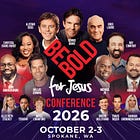The Great Evangelical Schism: Part 2, Politics
This post is part of a continuing essay series. The first installment can be read here:
If you desire to see the religion of Evangelicalism spring into full action, log on to social media and post the following: “A faithful Christian can vote for Democrats.” Chances are, your post will be flooded by comments from people informing you that you support demons and/or are a demon yourself. There is, of course, no explicit commandment in Scripture precluding a Christian in 21st-century America from voting for a Democrat over a Republican; neither party is free from the promotion of policies that a Christian, in their liberty of conscience, can consider beyond the pale. Yet, conservative Evangelicalism’s media class, which functions as its presbytery, tells a wholly different story of a binary battle of good versus evil, passing not through every man’s heart, as the dissident Russian author and Orthodox Christian, Aleksandr Solzhenitsyn, would say, but directly through the voting booth. Every election cycle, “conservative” Evangelical media erupts with pastors and theologians posting on social media, writing think pieces for journals, and releasing podcast episodes to let Christians know they have no choice but to vote for whomever the Republicans are running this year, even if both parties are now functionally pro-choice.
In response to this exaggerated thesis, an antithesis that equally syncretizes political counter-narratives into Evangelicalism has emerged in the last decade. This side is most prominently represented by the former head of the Southern Baptist Convention’s Ethics and Religious Liberty Commission, Russell Moore, who has very publicly expressed opposition to Evangelical support of Donald Trump, which has taken on its own aspect of religious imperative. New York Times columnist David French is another notable provider of antithesis, with regular anti-Trump appeals to his largely Evangelical audience, including an op-ed from last year that stated we must vote for Kamala Harris to “save conservatism from itself.” Veggie Tales creator Phil Vischer’s Holy Post podcast is known for its friendly interviews with authors and pundits who equate the faith to more left-leaning political stances. On both ends of the spectrum, outside of books and video series that present adults with simplified, youth-group-level theology, there is little more that mass-consumed Evangelical media speaks of than politics.
At the more reactionary ends of the religion of Evangelicalism, one can find entire articles justifying antichrist concepts, run by supposedly “Christian” journals, such as American Reformer, which is obsessed with political victory for their tribe at practically any cost. There are books of the month dedicated to shifting the Evangelical mind to a negative conception of Biblical concepts like “empathy,” for purely political ends. Evangelicalism’s internal enforcement of orthodoxy is also drawn more along political lines than theological. Reformed Baptist pastor Alistair Begg was roundly rejected by his peers as out of communion for stating that a woman could attend her grandchild’s LGBT wedding, when everyone knew she was personally convicted against the marriage, to show her Christian love. On the other hand, “Presbyterian” Douglas Wilson has several points of heretical doctrine, including one that was officially anathematized by multiple Presbyterian denominations, and yet he is still welcome in much of Evangelicalism, primarily because of his political belligerence. This political syncretization is not just found among lesser known characters. SBC megachurch pastor and Lifeway author Josh Howerton, who used to be seen as a relative moderate in that world, has recently begun to regularly echo some of the more reactionary political talking points on his podcast and social media.
In many ways, this is nothing new. Jerry Falwell famously blamed 9/11 on the rise of secularism, as did Pat Robertson with Hurricane Katrina. What we are seeing now are the fruits of half a century of the “Moral Majority” putting Evangelical focus on immediate political victory over gospel preaching, antagonistically treating non-Christians as the other and doubling down on politics when non-Christians understandably reject such framing. Evangelicalism’s most dedicated pundits see the ebbs and flows of conservative politics as representative of the American church, on the whole. This has been so generationally ingrained in Evangelical culture that Pew Research now treats “evangelical” as more of a political category than a religious one, and whole generations of Christians cannot fathom their faith being separated from political action—in many instances they cannot even answer basic questions of theology as readily as they can give their political imperatives. This widespread degradation of doctrine will be covered in the next installment.





Incredible work -- I came to a screeching halt at the end, not ready for this installment to be over! Courageously and perfectly put. Send any naysayers to me.
You described my disatisfifstion with the antithesis in a way I never thought of before. I think that’s why Russell Moore, Holy Post, and David French felt off was because they were trying to show what Christian politics should be and it did not paint a more attractive or active picture. I mean, they will never be as bold as Zohran Mamdani, but the fact they want politics to be a neutral outcome for Christian’s says a lot. They did not go to liberation theology they prefer Dallas Willard and Timothy Keller approach, but that’s what is so aggressively being tossed out by the Christian nationalist so easily that it’s no wonder no one is listening to them but the dissatisfied who want a place to be morally correct in there conscious.
Can’t wait for the next part!